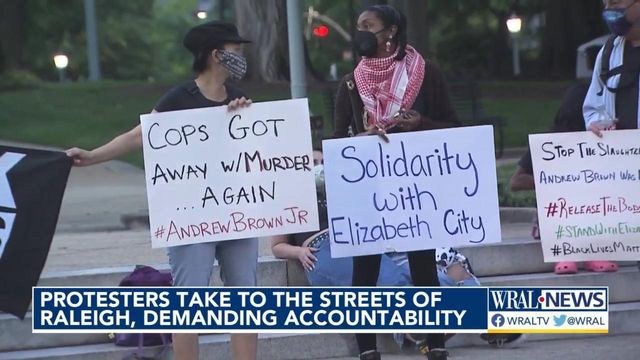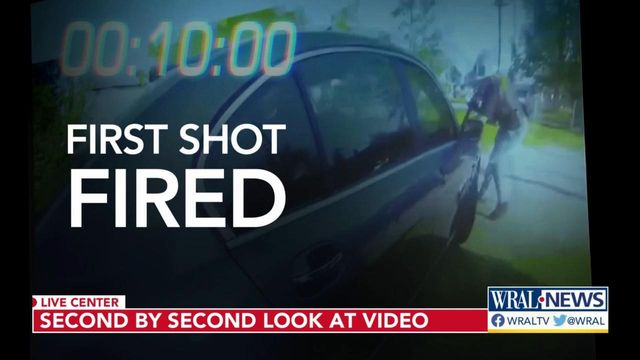Pasquotank deputies cleared in Andrew Brown's shooting death
No Pasquotank County deputy will face criminal charges in the fatal shooting last month of an Elizabeth City man, the district attorney announced Tuesday, ruling that the shooting was justified.
Posted — UpdatedAndrew Brown Jr., 42, was shot by deputies trying to arrest him on drug charges and to serve a warrant to search his home and car on April 21. Authorities said he had a history of resisting arrest, so several deputies went to his home.
"The facts of this case clearly illustrate the officers who used deadly force on Andrew Brown Jr. did so reasonably and only when a violent felon used a deadly weapon to place their lives in danger," District Attorney Andrew Womble said during a news conference.
Sheriff Tommy Wooten said the three deputies would be disciplined and retrained but would keep their jobs. He didn't say when they would return to active duty.
"In law enforcement, we have a higher responsibility to make the best decisions. We can always do better, and we must," Wooten said in a statement posted on Facebook. "This should not have happened this way at all. While the deputies did not break the law, we all wish things could have gone differently – much differently."
Womble gave a detailed account of the incident during the news conference and even showed video clips from different body-worn cameras that recorded the encounter to explain his decision.
The videos showed the deputies surrounding Brown's BMW outside his Perry Street home and yelling at him to show his hands. His car could then be seen backing up and then driving off through a vacant lot next door as deputies opened fire.
Sgt. Joel Lunsford, who was part of the detail sent to arrest Brown, was trying to open the driver's door and was almost hit by the BMW as Brown backed up, Womble said. He was then almost hit again as Brown drove away, the prosecutor said.
"The decision to flee, which Brown made on his own, quickly escalated the situation from a show of force to an employment of force," Womble said. "That he drove recklessly and endangered the officers is not uncertain. Therefore, I find that Brown's actions and conduct were indeed dangerous by the time of the shooting."
Meads fired the first shot into the BMW's windshield as Brown advanced, Womble said. A fusillade of other shots could be heard on the video as the car drove away. The car then crashed into a tree down the street, where the deputies found Brown dead.
Five seconds elapsed between the first and last shots, Womble said – the entire encounter was only 44 seconds, he said – and investigators recovered 14 shell casings from Brown's driveway and the vacant lot. An autopsy determined that Brown had been shot twice, once in the right arm and once in the back of the head, Womble said.
"There is no evidence that the number of shots fired by the deputies was excessive," he said. "The deputies used the amount of force deemed reasonably appropriate by them to neutralize a perceived threat."
No weapons were found in the car, but a plastic bag containing a white, powdery substance was found in a storage area on the driver's door, Womble said. A medical examiner found a second bag containing a crystallized substance in Brown's throat, suggested that he had tried to swallow it, Womble said. Both materials are being tested to determine if they're drugs.
Attorney Lee Turner, who has represented more than two dozen officers in use-of-force cases in Wake County and the surrounding area, watched the bodycam footage and said the shooting was legally justified under state law.
"You freeze time at the moment the officer pulls the trigger. What is the threat at that very moment? At that time, there are officers that are definitely in danger," Turner said.
Although Pasquotank County Sheriff's Office policy discourages deputies from shooting at moving vehicles or their occupants, North Carolina law allows deadly force to prevent an escape by means of a deadly weapon.
"People think of knives and guns and stuff as a deadly weapon. In this case, the vehicle is the deadly weapon," Turner said. "Once [Brown] made that decision that he was going to leave at whatever cost that it was going to take, they have to react to what is front of them at that moment in time."
Womble's decision not to press charges against any of the deputies prompted immediate criticism from Brown's family attorneys and civil rights groups.
"It should not come as a surprise that the criminal legal system has upheld the legitimacy of another police murder of a Black person," Kristie Puckett-Williams, statewide manager of the ACLU of North Carolina’s Campaign for Smart Justice, said in a statement. "The decision not to bring charges against those who killed Andrew Brown Jr. is a sign that the system is working as it was designed to. These cases of state-sanctioned murder are not anomalies. They are business as usual."
Civil rights activist Rev. Al Sharpton called Womble's reasoning "bizarre and unconvincing" and called on U.S. Attorney General Merrick Garland to appoint a special prosecutor in the case.
The FBI has already opened a civil rights investigation.
"It is obvious that there are political motivations behind the DA’s nonsensical and unjustifiable decision, and we intend to continue fighting for justice in this case," Sharpton said in a statement.
"I don't think he did a just job on this case," attorney Bakari Sellers said of Womble. "I do think he failed to do the basic tenets of his job, which is to represent victims."
Brown was clearly trying to flee and didn't represent a threat to deputies, Sellers said. None of the deputies was injured or even knocked to the ground in the incident, he said.
"What I saw was Andrew Brown trying to save his life," agreed Gerald Givens, president of the Raleigh-Apex NAACP. "I'm a veteran, and I know what it's like to be under fire. I can't imagine what was going on in Mr. Brown's mind at that time. ... I don't see what the DA saw with regards of the car being used as a weapon."
"If this was such a dangerous predicament, why were those four officers, why did they not fire or discharge their weapons if they thought their life or the lives of others were in danger?" Sellers asked of the other four deputies at the scene that morning.
Neither Lunsford nor Lt. Steven Judd, Sgt. Michael Swindell or Sgt. Kenneth Bishop fired a weapon during the incident, according to Pasquotank County Sheriff Tommy Wooten. Dare County Sheriff's Office investigators also were at the scene, Womble said, but they were parked down the street in an unmarked vehicle.
Womble said that he also believed that Brown was trying to flee and wasn't necessarily trying to harm any of the deputies, but that doesn't change the fact that his actions turned the BMW into a deadly weapon that threatened the safety of the deputies, making the shooting justified.
"As tragic as this incident is with the loss of life, the deputies on the scene were justified in defending themselves from death or great bodily injury," he said. "Once a threat is perceived and the officers fire the first shot, if the first shot is justified, the last shot is justified until the threat is extinguished."
Irving Joyner, a law professor at North Carolina Central University, said Womble misread state law, saying the direction Brown's car was headed in didn't put the deputies in imminent danger, so there was no cause for deadly force.
"If the car is going in the opposite direction of the officers, obviously there is not imminent danger," Joyner said. "When you look at North Carolina law, there are some serious raised as to the interpretation the district attorney has provided."
Joyner declined to say whether any of the deputies should have been charged, noting that he doesn't have access to all of the details.
Womble blamed the Brown family's attorneys for spreading what he called a false narrative about the case, prompting repeated protests in Elizabeth City in recent weeks.
"People made claims on camera that were knowing falsehoods and were directly refuted by the body camera video," he said. "This office put significant effort into ensuring that this decision was based on the facts and the law and not on public opinion."
Sellers said attorneys will continue to press for all of the video to be released. The sheriff has asked for the video to be released, but Womble said the only portions that should be released are the portions leading up to Brown's death.
Rev. T. Anthony Spearman, state NAACP president, said a "total investigation" is needed at the state and federal levels.
Gov. Roy Cooper and North Carolina Attorney General Josh Stein also called Tuesday for all of the video to be released.
"Federal officials should continue to thoroughly investigate the shooting of Andrew Brown Jr. in Elizabeth City. Public confidence would have been better served with a special prosecutor and by quickly making public the incident footage," Cooper said in a statement. "Our state should pass specific laws to increase transparency, confidence and accountability in the justice system."
“The trust in our criminal justice system that is currently fractured will only be more difficult to repair without complete transparency. Now that the investigation has concluded, it is imperative that the court authorize the release of the full video to the public immediately," Stein said in a statement.
Wooten said he would release portions of his office's internal investigative report, which included reviews by outside agencies and an expert in use-of-force cases. Among the problems he cited in the case: Some deputies never turned on their bodycams, paramedics should have been on standby and a more thorough threat assessment should have been completed before the incident.
Related Topics
• Credits
Copyright 2024 by Capitol Broadcasting Company. All rights reserved. This material may not be published, broadcast, rewritten or redistributed.






